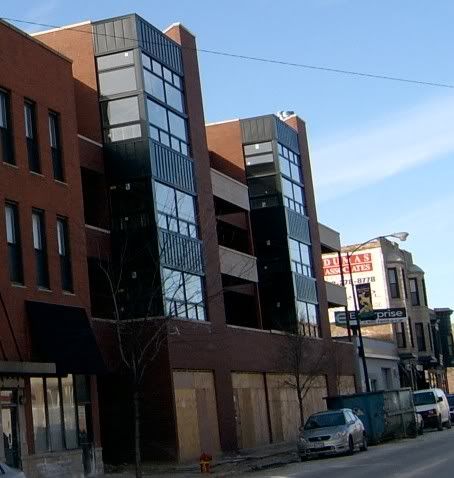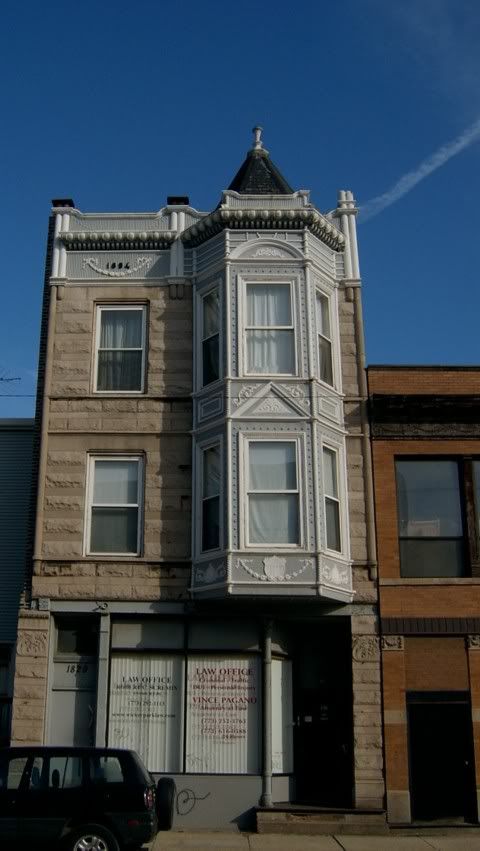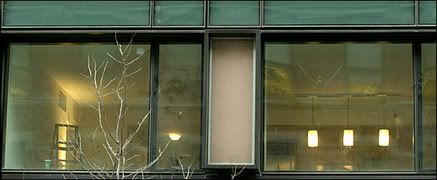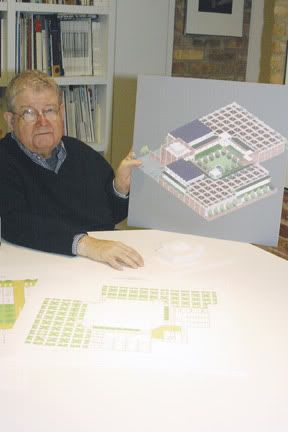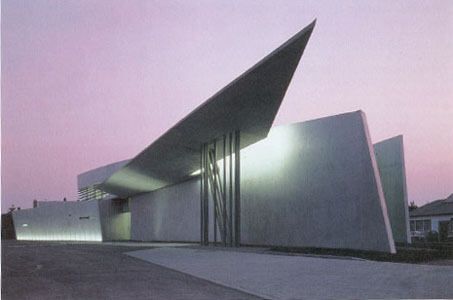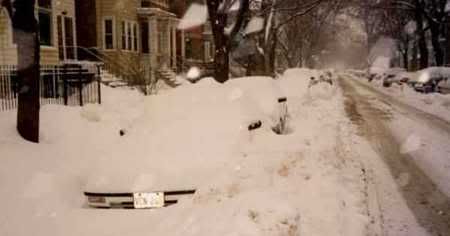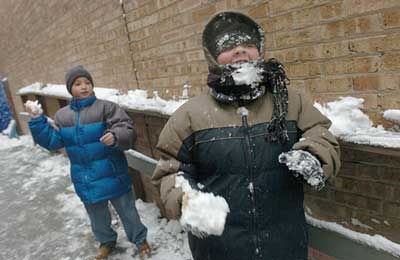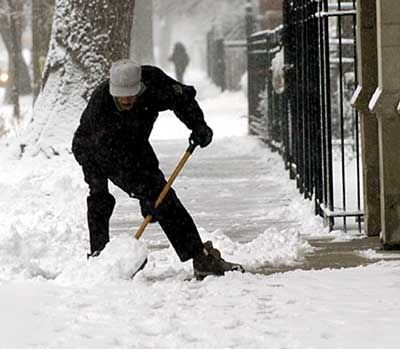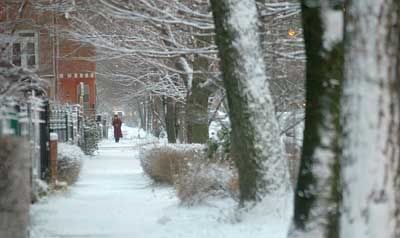
When Carl was a boy (he is in his 90s now), he and several other boys he
knew from the Lutheran church got a book with instructions for making a homemade telescope. They slowly ground the glass by hand using water and
grit, fashioned a tube and an eyepiece and assembled their new toy. It was
an exciting time. The sky was darker then, open to exploration with the simplist
tools. The Milky Way, the movements of the planets and the moon told a story to
those eager young students in the days before television, a story about gravity,
motion and the history of the universe. It was not the story they had heard in
Sunday School of a world born in seven days and nearly destroyed by the waters.
"Basically, we all became athiests," he tells me now.
I became aware that I was going to die at age 6. The knowledge, a sort of radical awareness of nothingness, just washed over me one night when I couldn't sleep, and I realized I was going to die. My parents didn't know what to do with me, of course, so they took me to church. Our church at that time was the
Morristown United Methodist Church, which is right on the square where they train Seeing Eye Dogs in Morristown, New Jersey. They had a fabulous organ which had been built into the new sanctuary (the church had a devastating fire in the early '70s). The preacher's name was Reverend White.
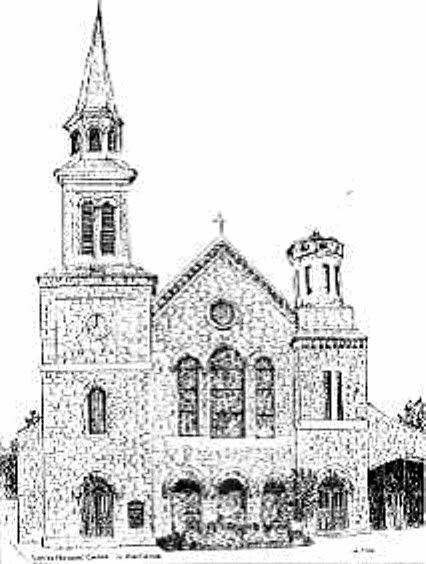
The Right Reverend told me there was an afterlife, that I could have eternal life if I accepted Christ and was saved. I really tried to believe that, because I was scared.
Growing up religion was a big part of my life. God was like an invisible friend I talked to constantly, and I saw life very much in religious terms. Church groups were the easiest place for me to make friends as we moved around the country. Religious groups generally have rules about how we treat other members, which meant that kids were not as cruel there as they could be in other settings. As a teenager religion took on a different role in my life. I began to participate in service projects and mission trips, such as the
Sierra Service Project in California, and an annual summer trip with
my church in Ohio that took us to Tennessee, Florida, and England. These trips were fun, because they involved spending days or weeks away from home with co-ed groups of teenagers and marginal adult supervision. Also, they gave life a sense of purpose and mission. Raising the money to fly to England was the motivation for me to get my first job, at McDonald's. Working with poor people on Indian reservations, in Appalachia, and in the Over the Rhine neighborhood of Cincinnati awakened in my a sense of the injustice of the world and a desire to set things right.
I also think rehabbing old buildings to create low-income housing in Over the Rhine awakened my love of old buildings and urban neighborhoods. Where we lived at the time was new, and "nice," and boring, sterile and unattractive, without any sidewalks, or anywhere you could walk to anyway. Over the Rhine was a mess, broken down with weeds growing up through the cobblestone alleys, abandoned storefronts and burned out apartment buildings. And it was beautiful.
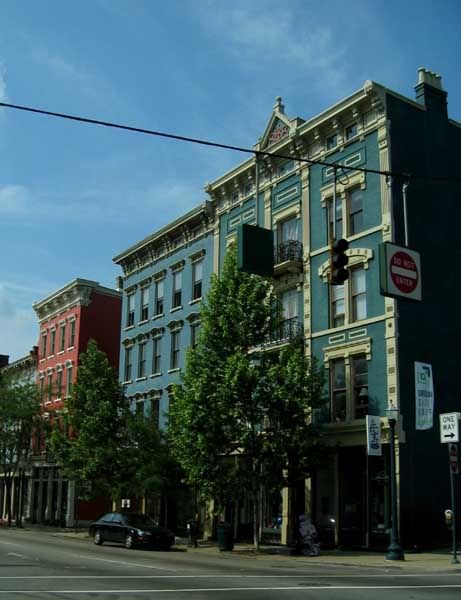
I was, of course, engaged in religious study at the time, which dovetailed nicely with my emerging social conscience. My Bible said things like this:
but whoever would be great among you must be your servant, and woever would be first among you must be your slave; even as the Son of man came not to be served but to serve, and to give his life as a ransom for many.
and this:
Then the King will say to those at his right hand, 'Come, O blessed of my Father, inherit the kingdom prepared for you from the foundation of the world; for I was hungry and you gave me food, I was thirsty and you gave me drink, I was a stranger and you welcomed me, I was naked and you clothed me, I was sick and you visited me, I was in prison and you came to me.' Then the righeous will answer unto him, 'Lord, whe did we see see thee hunger and feed thee, or thirsty and give thee drink? And when did we see thee a stranger and welcome thee, or naked and cloteh thee? And when did we see thee sick or in prison and visit thee? And the King will answer them, 'Truly, I say to you, as you did it to one of the least of these my brethren, you did it to me.'
after which those people who had done nothing to help the poor and downtrodden were to get their asses righteously kicked.
And here was the real kicker:
And Jesus said to his disciples, "Truly, I say to you, it will be hard for a rich man to enter the kingdom of heaven. Again I tell you, it is easier for a camel to go through the eye of a needle than for a rich man to enter the kingdom of God." When the disciples heard this they were greatly astonished, saying, "who then can be saved?" But Jesus looked at them nad said to them, "With men this is impossible, but with God all things are possible."
So in addition to spending as much as my free time as could be spared from the brooding and the teenage angst feeding the hungry, rehabbing housing for the homeless and visiting the sick and elderly, I attempted to to engage my family in discussions about our shared faith. Specifically I was concerned that perhaps we should not be living in such a large house and enjoying so many of the good things in life while homeless people were dying of AIDS in the street just a few miles away. Such behavior seemed to me to invite the wrath of God upon us. These suggestions met with a somewhat lukewarm response.
Other significant things were happening in my life at this time as well. A close friend of mine came out to me when I was fourteen, setting up the essential conflict, for both of us, between faith in God and the essential irrelevance of many of the traditional behavioral strictures of the Bible to modern life. For my friend, this struggle could never be resolved: last time I saw him he was one of these "ex-gay" religious people, convinced he can "overcome" his "condition" through faith. I didn't have such problems with it. I had always made some distiction between the
red type* which talked about love and justice and redemption, and the black type which talked about smiting people and not wearing cotton-polyester blends.
For the next few years, these issues of sex and identity - abortion, homosexuality, premarital sex, "obscene" art. My mother was outraged by the
Robert Mapplethorpe exhibit at the Contemporary Arts Center in
Cincinnati. It was a
huge issue in Cincinnati at that time.
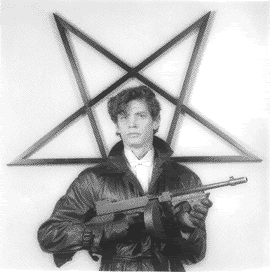
I thought she was being a
fascist. I guess I still do.
My faith in God just melted away almost as soon as I left home. For one thing, being exposed to other religions, especially Buddhism, made me question why I should pick just one. It seemd arbitrary to just keep believing whatever religion I happened to be raised in - not at all rational. For another thing, it just seemed to me that Christians were either on the wrong side of the issues of the day, or just didn't seem to care about them, using their faith to comfort them while they went about their daily lives in the same self-interested way everyone else did - in fact more so.
In a nutshell, the combination of Christian passivity in the face of poverty and war with the archaic positions on social mores taken by the religious people I was closest to drove me from the fold. If most Christian churches had a relevant and compassionate doctrine on sexuality, especially regarding homosexuality and abortion, I would probably still be in the church. Fundamentally it was those issues which drove me away. But honestly resolving those issues now would not lure me back. Once the underlying authority and wisdom of the institutions and their primary doctrines have been undermined, it is just no longer possible for them to function as articles of faith for me any longer. I can't force myself to believe in such things as a personal God or life after death without evidence. It would literally take a miracle.
Lately I've been thinking about these issues because of everything that's been going on in the world. Terrorists inspired by religion are just the beginning. Last week I heard a panel of students at the University of Chicago talk about their experiences as
human rights interns around the world. The interns, who had worked in Ghana, Iran, Trinidad and Tobago, and right here in Illinois, had all been hampered in their work to further human freedom and empowerment by religious people who felt that homosexuality is evil, or that women should stick to certain subordinate roles in society, or that sex should be kept under wraps, or simply that no one should question religious authorities at all.
And then, of course, there's the tsunami. It has been interesting seeing religious authorities attempt to reconcile the violent reality of the natural world with their faith in a loving and just God. These great
links from Zorn's Notebook cover a variety of perspectives.
It seems to me that if there's a guiding intelligence behind the world, it's a cruel one. But
Occam's Razor suggests that a controlling intelligence is not needed to explain such things. It seems more likely that such events happen the way scientists describe them, with no intent or underlying anthropomorphic purpose. If that's the case, what's the use of praising a creator or begging one for mercy? It seems unlikely He will do anything.
I don't have a deep new insight into the ultimate source of the universe. I suspect that the world we know is an illusion, that time, space and matter seem to behave the way they do only because of the position and situation of the observer. But I don't know what to do with that insight, or what it even means. For now it's enough for me to know that all of the old stories people use to explain the world are not true.
This perspective presents practical problems in today's America, and I don't just mean getting along with believers. Some of the best people I know are Christians, and their faith motivates them to do very positive things in the world, and gives them hope and the ability to persevere in the face of reversals. In fact that's exactly my problem - religious faith is a powerful tool for change. It can provide people with a vision, the ability to see the world from the outside. Just as fundamentalism tends to calcify the behavioral norms of past generations into dogma, radical religion can point out the inconsistencies between social practice and basic humanistic morality, as it did for me as an adolescent. It can call people to reinterpret eternal principles to fit the needs of the day, as it did in the civil rights movement, the Social Gospel and the anti-slavery movement.

I believe another such widespread spiritual awakening could yet save America. But just because I desire such a movement or believe it to be necessary doesn't mean I could believe in it.
*the song is by Trope's friend EL's band Canasta, who play out in Chicago and elsewhere from time to time. The singer, ironically, looks a lot like that famous "white boy Jesus" painting everybody's Grandma used to have in the parlor. I once had a "motorist's prayer" card in my wallet that looks just like him.
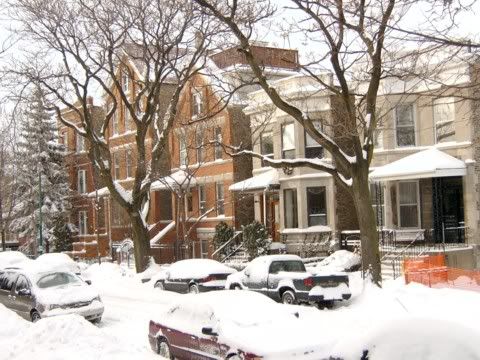
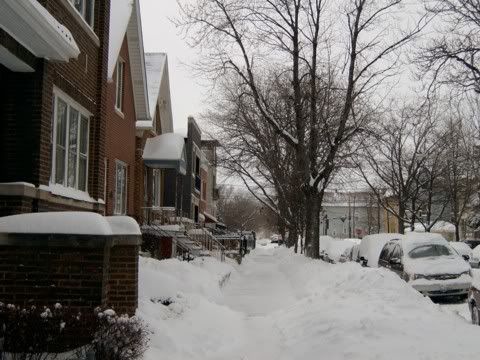
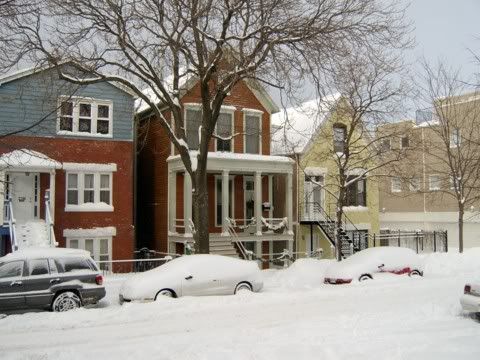
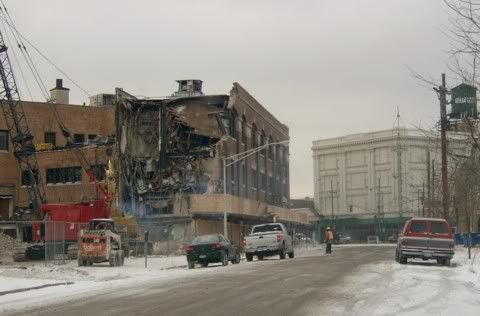
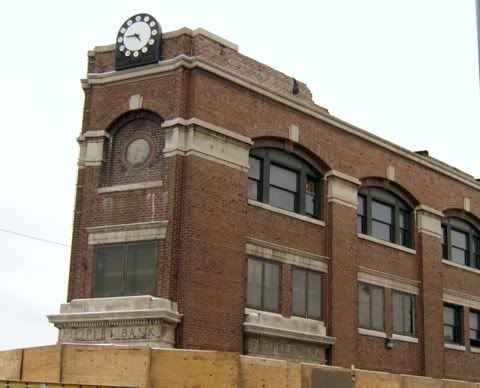
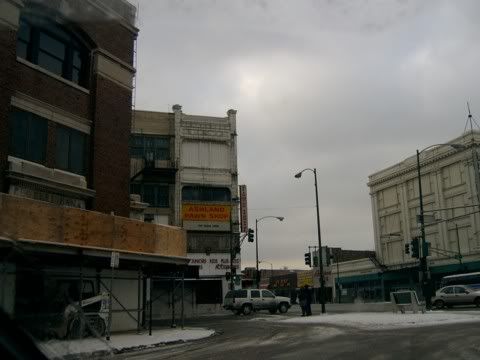
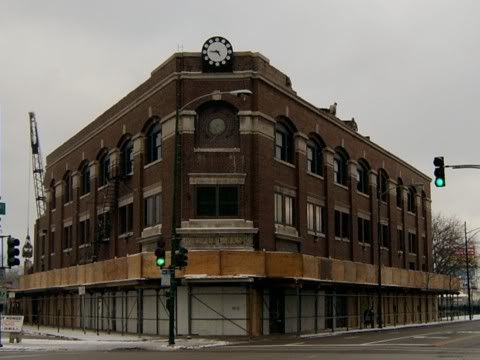

 The Right Reverend told me there was an afterlife, that I could have eternal life if I accepted Christ and was saved. I really tried to believe that, because I was scared.
The Right Reverend told me there was an afterlife, that I could have eternal life if I accepted Christ and was saved. I really tried to believe that, because I was scared.

 I thought she was being a
I thought she was being a 




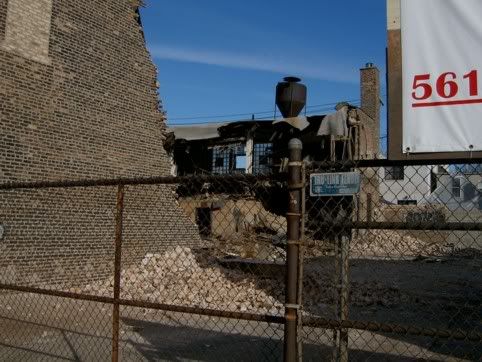 Today's victim of "progress" is an old mixed use commercial/residential building along Milwaukee Avenue between Leavitt and Oakley, a few blocks from our home. The area has been undergoing a transition from mostly industrial and commercial uses as demand for housing in Bucktown has increased. As empty lots and industrial buildings have been replaced by new commercial residential buidings, Milwaukee between the tracks and Western Ave has become an interesting amalgam of 19th and 21st century styles.
Today's victim of "progress" is an old mixed use commercial/residential building along Milwaukee Avenue between Leavitt and Oakley, a few blocks from our home. The area has been undergoing a transition from mostly industrial and commercial uses as demand for housing in Bucktown has increased. As empty lots and industrial buildings have been replaced by new commercial residential buidings, Milwaukee between the tracks and Western Ave has become an interesting amalgam of 19th and 21st century styles. 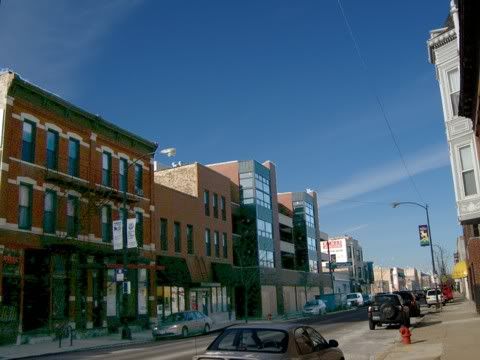 It's been a fairly successful mix, redevelopment of what had been a fairly forlorn stretch of road being spurred on by the establishment of a couple of fine restaurants,
It's been a fairly successful mix, redevelopment of what had been a fairly forlorn stretch of road being spurred on by the establishment of a couple of fine restaurants, 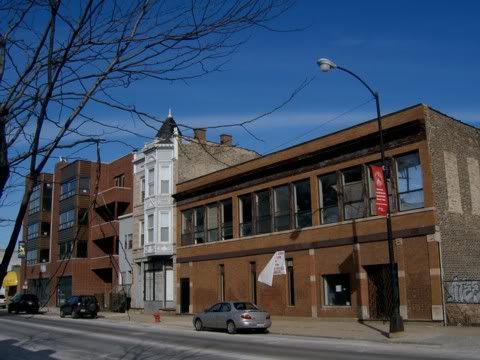
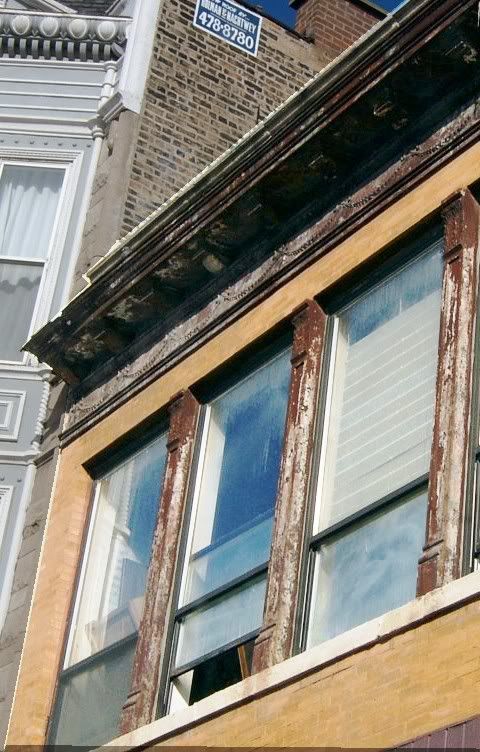 Compare that to the stripped-down, geometric detail on the block's new buildings:
Compare that to the stripped-down, geometric detail on the block's new buildings:
